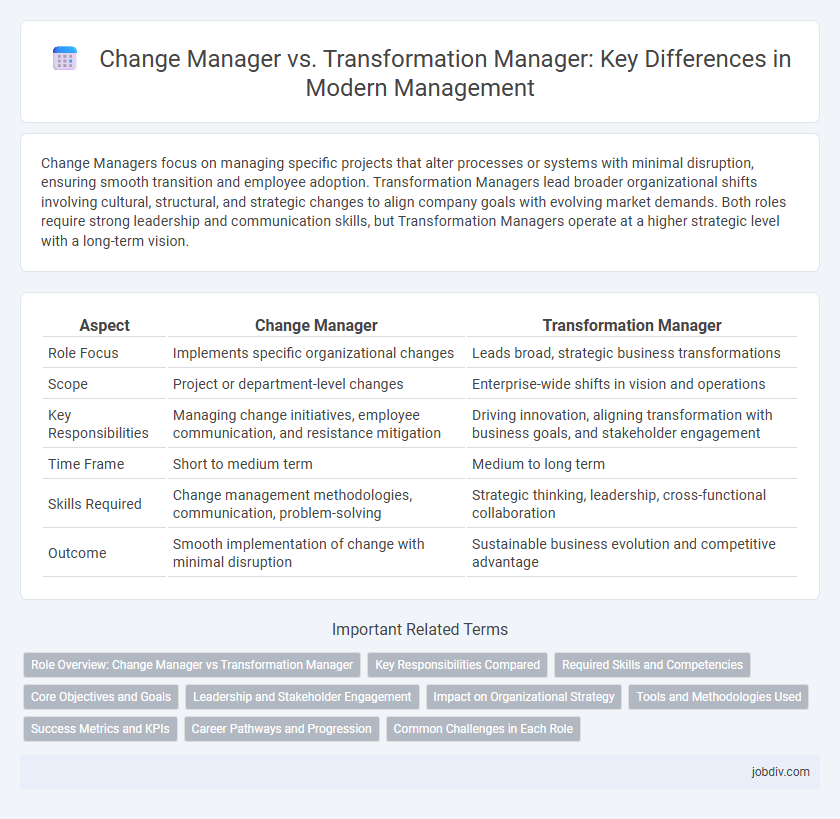Change Managers focus on managing specific projects that alter processes or systems with minimal disruption, ensuring smooth transition and employee adoption. Transformation Managers lead broader organizational shifts involving cultural, structural, and strategic changes to align company goals with evolving market demands. Both roles require strong leadership and communication skills, but Transformation Managers operate at a higher strategic level with a long-term vision.
Table of Comparison
| Aspect | Change Manager | Transformation Manager |
|---|---|---|
| Role Focus | Implements specific organizational changes | Leads broad, strategic business transformations |
| Scope | Project or department-level changes | Enterprise-wide shifts in vision and operations |
| Key Responsibilities | Managing change initiatives, employee communication, and resistance mitigation | Driving innovation, aligning transformation with business goals, and stakeholder engagement |
| Time Frame | Short to medium term | Medium to long term |
| Skills Required | Change management methodologies, communication, problem-solving | Strategic thinking, leadership, cross-functional collaboration |
| Outcome | Smooth implementation of change with minimal disruption | Sustainable business evolution and competitive advantage |
Role Overview: Change Manager vs Transformation Manager
Change Managers focus on overseeing specific organizational initiatives to implement new processes, tools, or behaviors with minimal disruption. In contrast, Transformation Managers drive large-scale, strategic shifts that fundamentally alter company culture, business models, or market positioning. Both roles require stakeholder engagement and communication, but Transformation Managers operate on a broader scope involving continuous innovation and systemic change.
Key Responsibilities Compared
Change Managers primarily focus on overseeing and facilitating specific organizational changes, ensuring smooth transitions through communication, stakeholder engagement, and training. Transformation Managers lead broader, strategic initiatives aimed at fundamentally altering business processes, culture, and technology to drive long-term growth and agility. While Change Managers handle project-level adaptations, Transformation Managers manage enterprise-wide shifts that align with overall business objectives.
Required Skills and Competencies
Change Managers require strong communication, stakeholder engagement, and risk management skills to effectively guide organizations through incremental adjustments. Transformation Managers necessitate strategic thinking, innovation leadership, and cross-functional collaboration competencies to drive large-scale, organization-wide shifts. Proficiency in data analysis and change impact assessment enhances effectiveness in both roles, but Transformation Managers often need a deeper understanding of digital technologies and business model innovation.
Core Objectives and Goals
Change Managers focus on managing specific change initiatives by minimizing disruption and ensuring smooth adoption through clear communication and stakeholder engagement. Transformation Managers drive comprehensive organizational change by aligning strategic goals with cultural shifts and long-term business outcomes to enhance overall performance. Both roles aim to improve organizational effectiveness but differ in scope, with Change Managers targeting tactical execution and Transformation Managers overseeing broad strategic evolution.
Leadership and Stakeholder Engagement
Change Managers excel in guiding teams through specific project-oriented adjustments, emphasizing clear communication and managing resistance to ensure smooth adoption. Transformation Managers lead broad, strategic shifts across organizations, engaging diverse stakeholders by fostering a shared vision and aligning leadership structures. Effective leadership from both roles hinges on actively involving stakeholders to drive commitment and sustain long-term organizational success.
Impact on Organizational Strategy
Change Managers focus on incremental adjustments within existing processes to align operations with short-term goals, ensuring smooth transitions and minimizing disruption. Transformation Managers drive comprehensive, strategic shifts that redefine organizational vision and culture, fostering long-term competitive advantage. Their impact on organizational strategy differs significantly, with Change Managers supporting tactical execution and Transformation Managers steering fundamental evolution.
Tools and Methodologies Used
Change Managers primarily utilize tools such as Prosci ADKAR, Kotter's 8-Step Process, and stakeholder analysis frameworks to drive incremental change within organizations. Transformation Managers leverage more comprehensive methodologies including Agile, Lean Six Sigma, and digital transformation platforms to enable large-scale, strategic shifts. Both roles employ change impact assessments and communication plans, but Transformation Managers integrate technology-driven tools to manage complex, cross-functional transformations.
Success Metrics and KPIs
Success metrics for Change Managers typically center on employee adoption rates, stakeholder engagement levels, and the reduction of resistance during transitions, while Transformation Managers focus on KPIs such as overall organizational performance improvements, revenue growth, and market share expansion. Change Manager success is measured by the effectiveness of communication plans and training completion rates, ensuring operational continuity during change initiatives. Transformation Manager KPIs emphasize long-term strategic outcomes, including innovation adoption, cultural shifts, and business model realignment, reflecting comprehensive enterprise evolution.
Career Pathways and Progression
Change Managers typically focus on managing specific projects or initiatives, developing skills in stakeholder engagement, communication, and risk management, with career progression often leading to senior change or project management roles. Transformation Managers oversee broader organizational shifts, requiring expertise in strategic planning, cross-functional leadership, and innovation management, which paves the way toward executive positions like Chief Transformation Officer or Director of Organizational Development. Career pathways in both roles demand continuous learning in change methodologies, business acumen, and leadership capabilities to advance within dynamic corporate environments.
Common Challenges in Each Role
Change Managers face challenges like employee resistance, communication breakdowns, and maintaining project scope during organizational transitions. Transformation Managers often struggle with aligning strategic objectives, integrating new technologies, and managing cross-functional collaboration to drive large-scale change. Both roles require strong leadership, adaptability, and stakeholder engagement to overcome these common hurdles effectively.
Change Manager vs Transformation Manager Infographic

 jobdiv.com
jobdiv.com